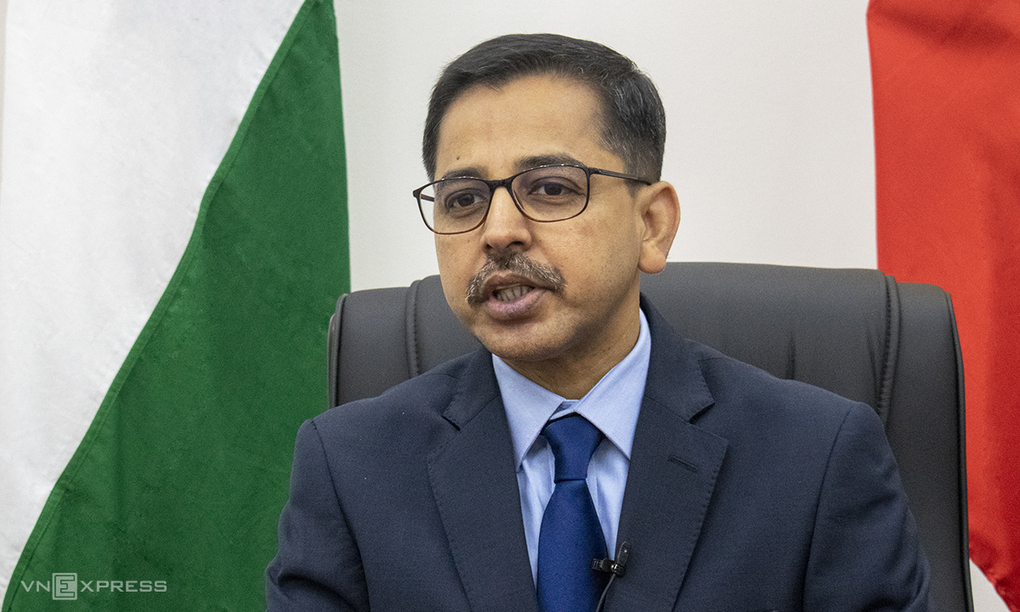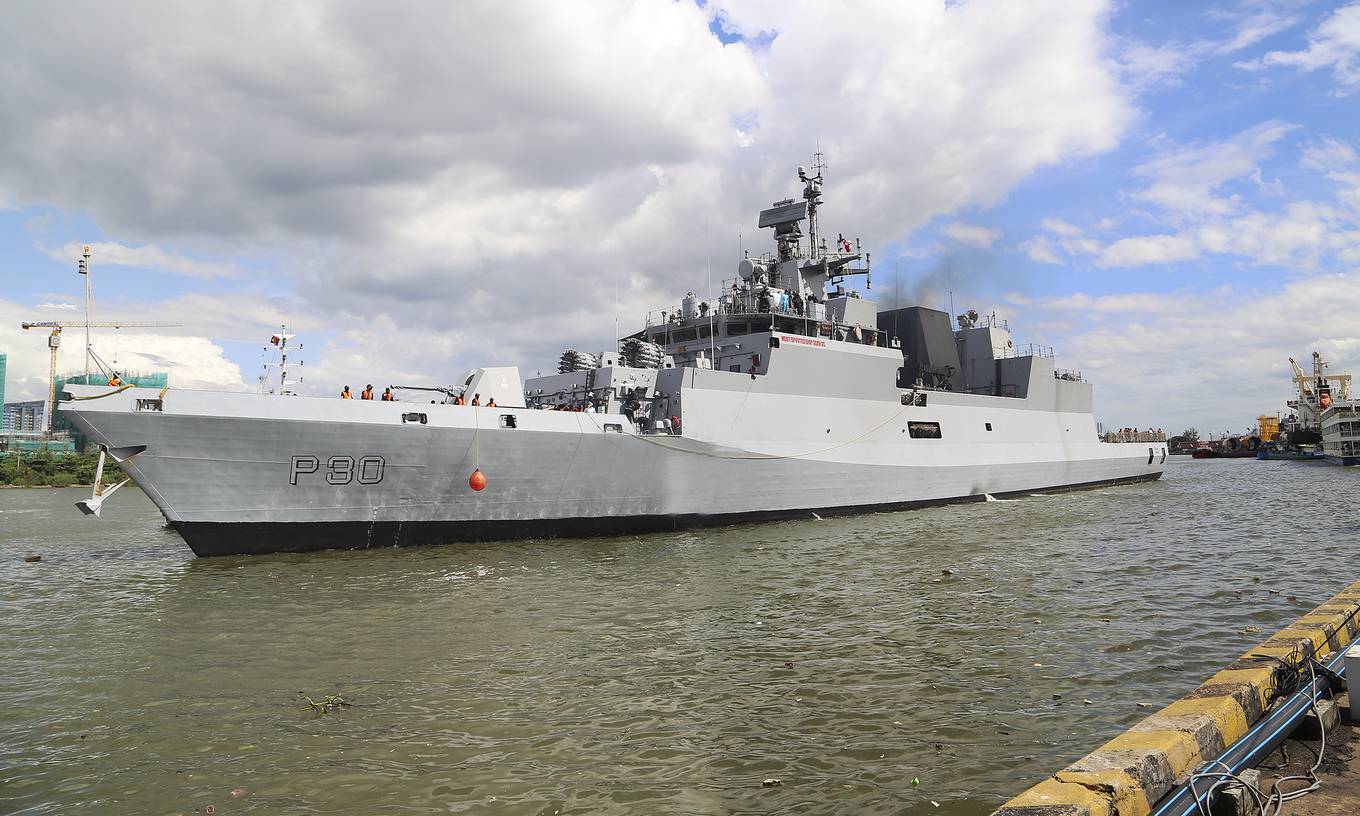Read Online:
https://vnexpress.net/dai-su-an-do-chia-se-ve-hop-tac-quoc-phong-voi-viet-nam-4240948.html
https://e.vnexpress.net/news/news/vietnam-india-defense-cooperation-plows-ahead-in-covid-19-times-envoy-4244809.html

Q1. How do you think about defence cooperation between India and Vietnam? What are the new areas being identified between India and Vietnam in defence cooperation field?
Defence and security cooperation between India and Vietnam is an important pillar of our Comprehensive Strategic Partnership and reflects the deep levels of mutual trust and understanding between our two countries.
A Memorandum of Understanding on Defence Cooperation signed between our Ministries of Defence in 2009 and the India-Vietnam Joint Vision on Defence Cooperation signed by our Defence Ministers in 2015 provide the broad institutional framework under which our defence partnership has developed in recent times.
From traditional exchanges between the Ministries of Defence of the two sides, this engagement has today diversified to wide-ranging contacts between the services and military-to-military exchanges, including visits of senior military leaders, capacity building and training programmes, and bilateral exercises. Our Navies and Coast Guards are engaged in regular exchange of ship visits and port calls. Cooperation in United Nations Peace Keeping Operations is another key area of our cooperation.
Moving into the future, our defence cooperation will be guided by the historic “Joint Vision for Peace, Prosperity and People” adopted by our Prime Ministers at the Virtual Summit on 21 December 2020.
During the Virtual Summit, our leaders expressed their resolve to step up bilateral defence exchanges and affirmed that enhanced defence and security partnership between India and Vietnam will be an important factor of stability in the Indo-Pacific region.
A further enhancement of our defence engagements is through a fast-growing defence industrial and technological collaboration focusing at defence modernization and capacity building, driven by India’s two Defence Lines of Credit to Vietnam worth US$600 million.
Q2. How do you think about cooperation between India and Vietnam in 2020?
Despite the disruptions caused by the COVID-19 pandemic, our bilateral defence cooperation maintained a positive momentum in 2020. Just before the pandemic struck, Vietnam’s Deputy Defence Minister Sr. Lt. Gen. Be Xuan Truong visited India to attend our premium defence event, the Def-Expo in February 2020.
After the pandemic, both sides prudently adapted to the new situation and maintained the momentum of engagements, including high-level engagements, through virtual platforms. Our Defence Ministers held on-line dialogue in November 2020 and exchanged views on several bilateral, regional and global issues of mutual interest. Defence Minister of India participated in the 7th ADMM Plus meeting and the 10th anniversary celebrations of the ADMM Plus hosted on-line by Vietnam, where he was invited by Vietnam to deliver a special address, reflecting our close relations.
India and Vietnam also maintained close communication on our management of COVID-19 pandemic and the role played by our militaries in this effort. Military Medical Departments of both countries held on-line interactions to exchange valuable experiences and discuss response, diagnosis, preventive and treatment measures. India also conducted an online COVID-19 management course for military officials of Vietnam, along with those from Cambodia, Myanmar and Laos.
An Indian Naval Ship (INS KILTAN) visited Ho Chi Minh City in December 2020, carrying 1500 tons of flood relief material for the victims of floods in Central Vietnam, during which it carried out a Passage Exercise with Vietnam People’s Navy.
Our Defence industry collaboration made significant progress in 2020 through continued implementation of our Defence Lines of Credit, as also the signing of a framework arrangement for our future partnership in this area. In addition, in 2020, important bilateral agreements were signed for cooperation in the fields of Hydrography and UN Peace Keeping Operations. An agreement for Indian grant assistance of US$ 5 million for setting up of an Army Software Park in the Telecommunication University in Nha Trang was also signed in 2020.
So, as you can see, despite the pandemic’s impact, 2020 was an active year for India-Vietnam defence cooperation.

Q3. Could you provide inputs on implementation of Line of Credits given by India to Vietnam?
As I mentioned earlier, Defence Industry Cooperation between India and Vietnam built upon the Defence Lines of Credit is an important part of our defence partnership and is fast gaining significance. Government of India has extended two Defence Lines of Credit – one for US$ 100 million and another for US$ 500 million – to boost our defence industrial engagement with Vietnam.
An important focus of this partnership is on strengthening Vietnam’s defence manufacturing. For example, as part of the project for construction of 12 High Speed Guard Boats for Vietnam Border Guard Command under the US$ 100 million defence Line of Credit, five boats are being constructed in India, while the remaining seven are being constructed in Vietnam. The project has made significant progress in 2020 and the first boat has already arrived in Vietnam. Construction of boats, which will be manufactured in Vietnam, has also commenced last year. The project is a shining example of our Defence Industrial cooperation and is on track to be completed in 2021. The US$ 500 million Defence Line of Credit is also at an advanced stage of finalization and both sides are hopeful of its early implementation.
Q4. What are the training programmes India organizes for the Vietnamese defence personnel?
India offers training courses to Vietnam’s defence personnel under the Indian Technical and Economic Cooperation, or what is popularly known as the ITEC programme. In addition, specialized tailor-made courses are offered from time to time to Vietnamese defence personnel based on their requirements. We also regularly invite Vietnamese officers to attend seminars and workshops organised by Indian defence institutes. India has also cooperated with Vietnam in training peacekeeping contingents for UN deployment. There is also ongoing delegation exchange programme at various levels to share experiences for mutual benefit.
Q5. Recently India and Vietnam held PASSEX exercise, can you elaborate on this exercise?
As I said earlier, an Indian Navy ship – INS KILTAN – visited Ho Chi Minh City in December 2020 as part of India’s vision of SAGAR, that is “Security and Growth for All in the Region”, carrying 1500 tons of relief material for the victims of floods in Central Vietnam. During the visit, the Indian Navy ship also conducted a Passage Exercise (PASSEX) with Vietnam People’s Navy as part of their ongoing bilateral professional exchanges.
Q6. What is India’s Indo-Pacific Vision, and where Vietnam fits into it?
India’s Indo-Pacific Vision, which was articulated in detail by Prime Minister Modi in his speech at the Shangri La Dialogue in June 2018, is premised on the basic recognition that opportunities and challenges in the Indian and the Pacific Oceans cannot be artificially separated. It also recognizes the new growth realities that this geographical space represents.
India’s Indo-Pacific Vision is for a free, open, peaceful, prosperous and above all, an inclusive region, with rules-based order and respect for sovereignty of nations. As the largest economy in the Indian Ocean and as a country significantly integrated with the Pacific Ocean through trade, India has a natural interest in the peace, stability and development of the Indo-Pacific region.
India views the Indo-Pacific as a positive construct of development and connectivity, in which India can play a unique role by virtue of its geographical location and economic strengths. This vision has an economic focus with emphasis on collective prosperity through collaboration and connectivity.
Most importantly, India’s Indo-Pacific Vision is premised on ASEAN’s centrality, with our ‘Act East Policy’ as its main driver.
To translate this vision into practical cooperation, at the East Asia Summit in 2019, Prime Minister Modi further articulated our Indo-Pacific Oceans Initiative (IPOI), which provides a detailed template for partnership-based cooperation in the Indo-Pacific across seven verticals focusing on areas such as maritime security, marine ecology and environment, as well as maritime connectivity.
We are happy that ASEAN countries, including Vietnam, have come up with their own Outlook on the Indo-Pacific (AOIP), which is broadly similar to our Indo-Pacific Vision and the Indo-Pacific Oceans Initiative. Together, they provide a useful roadmap to promote regional integration, physical and digital connectivity, and economic cooperation.
As a close partner of India with multifaceted political, economic and security cooperation and as a key link in India’s engagement with ASEAN, Vietnam is clearly an indispensable partner in our Indo-Pacific Vision, based on our shared values and interests in promoting peace, stability and prosperity of our region.
***











